Congress of Vienna
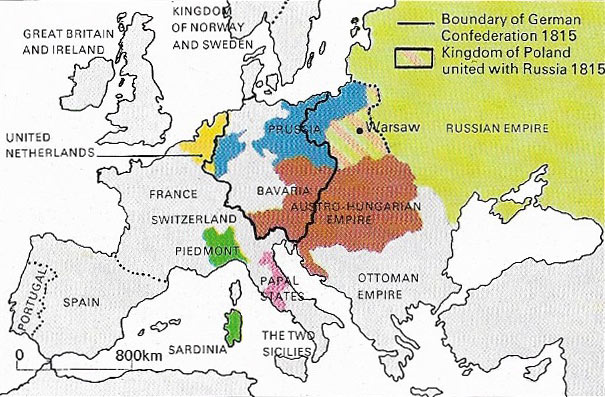
Figure 1. The map of Europe had to be redrawn after the 1815 Vienna settlement. The Hapsburg Empire received the Illyrian provinces and the two provinces (Lombardy and Venetia) in return for the former Austrian Netherlands (Belgium). Sweden won Norway, which had been Danish; Russia kept her conquest, Finland, and dominated the new "puppet" kingdom of Poland. Prussia kept Polish Posen, Received almost half the Kingdom of Saxony and an area of the Rhineland that included the iron and coal resources of the Ruhr. Britain consolidated her overseas empire and naval routes with the Cape of Good Hope, Malta, the Ionian Islands, Ceylon, Mauritius, Tobago, St. Lucia and Heligoland. Partly through these overseas acquisitions, Britain grew relatively remote from 19th-century European politics.
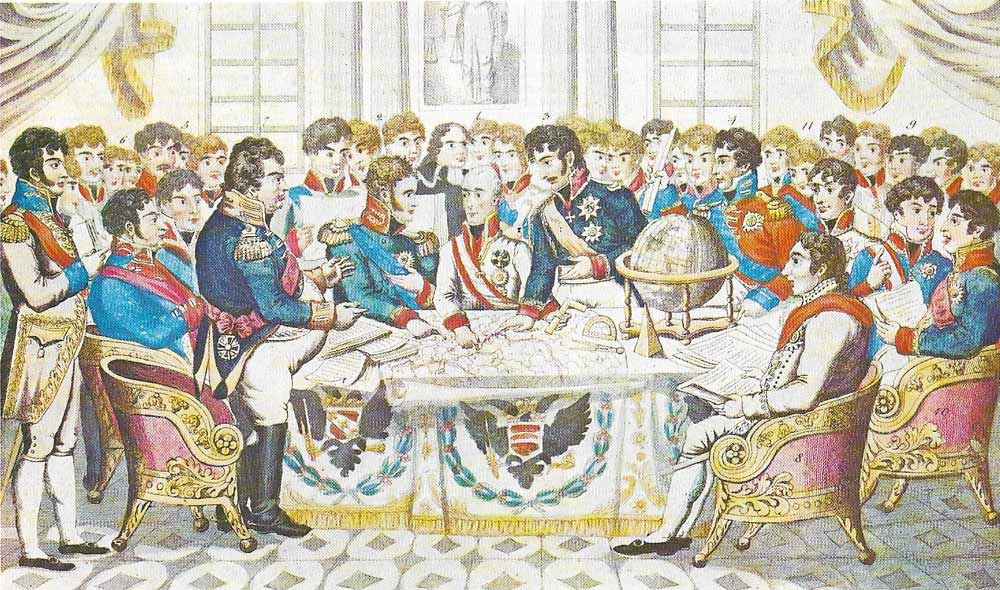
Figure 2. The diplomats at Vienna reached compromises over their territorial ambitions but there was to be no compromise with the new forces of liberalism and nationalism. Within 15 years unrest in Spain, Portugal, Italy, Germany and France showed the growing desire for constitutional restraints on the monarchies that had been restored. Nationalists were crushed in the Polish revolt of 1830. They won independence for Belgium (1830) and Greece (where war with the Turks began in 1821). These threats to the Vienna settlement were the main topics discussed at the four subsequent congresses: Aix-la-Chapelle (1818), Troppau (1820), Laibach (1821), and Verona (1822). Greek independence was a blow, weakening Turkish resistance to the nationalist claims of her other Balkan states.
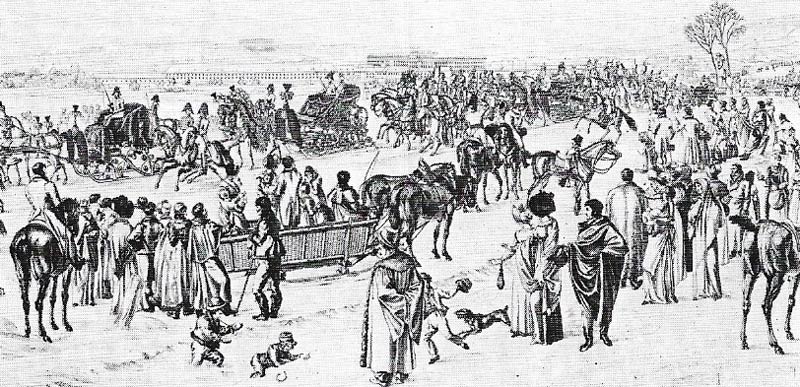
Figure 3. A grand sleigh ride was included in one of the weekly programs issued by the Festivals Committee responsible for entertaining the visitors. The expenses were paid by the emperor.
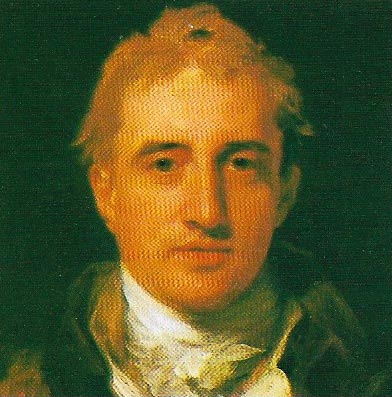
Figure 4. Viscount Castlereagh (1769–1822) was Britain's foreign secretary from 1812. Regarded as reactionary at home he proved too liberal for the Congress system, which he had hoped would provide a diplomatic arena for peaceful change.
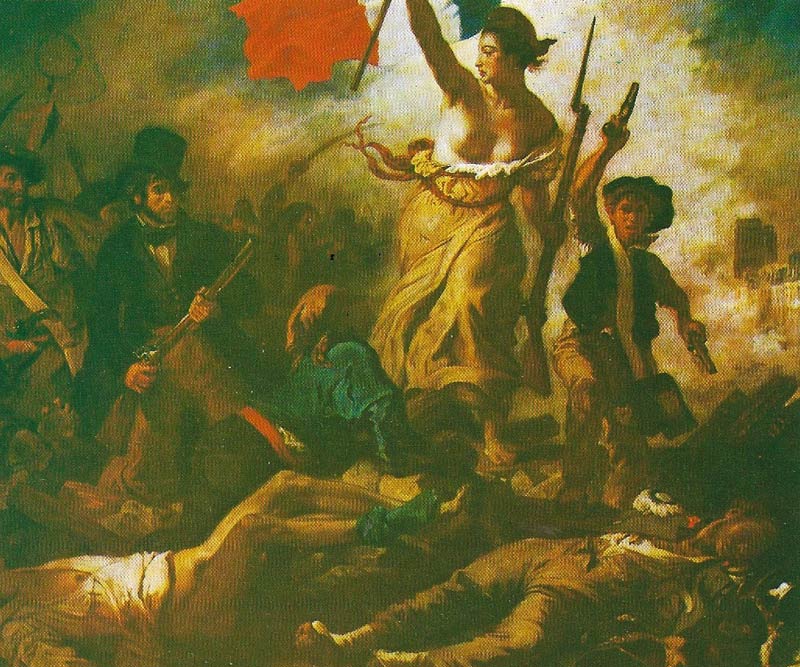
Figure 5. Frequent liberal and nationalist revolts threatened the settlement but were usually suppressed. Eugene Delacroix (1798–1863) won the Legion d'honneur for his painting "Liberty leading the People", after the successful French revolt of 1830.
Even before Napoleon Bonaparte's first defeat, in 1814, the idea of an international diplomatic assembly to restore order in Europe was proposed by Prince Metternich of Austria (1773–1859). Intended to ratify decisions made at the first Treaty of Paris, the Congress was announced and from September 1814 delegates from throughout Europe arrived in Vienna. From the start the Congress was dominated by four great powers, Austria, Britain, Prussia and Russia, although Prince Talleyrand (1754–1838) soon skillfully gained an equal voice for France.
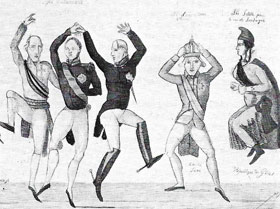 |
| In 1815 Napoleon was safely on St Helena and the waltz took fashionable society by storm. The monarchs of Europe danced to celebrate the restoration of their political power and the promise of armed backing by all powers. Five monarchs and the heads of 216 Princely families arrived in Vienna for the peace negotiations and the festivities. Their fear of revolution and desire to restore the political situation of the 18th century meant that France was left intact. |
The distribution of rewards
It was hoped to prevent any one power from gaining more than its fair share of rewards, and to establish a balance of territorial interests. In fact Russia took the major share and established a dangerous foothold in Europe. From this time until the Crimean War (1854–1856), fear of Russia was a dominant theme in European diplomacy.
At the Congress of Vienna, however, the immediate fear was that France might cause another European war. Three buffer states were created to hinder her expansion eastwards (Figure 1). The Kingdom of Piedmont was strengthened; Belgium (previously the Austrian Netherlands) was joined with Holland in the kingdom of the Netherlands; and the Holy Roman Empire (consolidated by Napoleon into the Confederation of the Rhine) became the German Confederation – 39 states joined in a weak Bund and dominated by an Austrian president.
Yet in the treaties of Paris of 1814 and 1815, France was generously treated. The frontiers of 1790 were restored and an army of occupation was installed only until France had paid an indemnity of 700 million francs to the allies – a condition met by 1818. Although the monarchy was restored in the shape of Louis XVIII (1755–1824), he was obliged to reign under the charter of 1814.
A new political settlement
In addition to the territorial changes, political settlement was considered essential for future peace. The French Revolution was largely blamed for the upheavals and wars of the pervious generation. The best hope for stability seemed to lie in the restoration of the legitimate monarchs who had been overthrown. To try to prevent future disturbances in Central Europe, the heads of state of the German Confederation were advised to offer constitutions to their subjects – advice which, for the most part, they subsequently ignored.
Finally, the Vienna settlement had to be maintained; to this end the four great military powers – Austria, Russia, Prussia and Britain – renewed their Quadruple Alliance and pledged to uphold the settlement, by force if necessary, for 20 years. Viscount Castlereagh (Figure 4), the British foreign secretary, in particular saw an alliance as fundamental to the maintenance of the balance of power in Europe, and the four powers agreed to hold periodic peacetime conferences to settle disputes and problems that might arise.
But the relative cooperation and harmony of views shown at Vienna did not continue in the four later congresses held between 1818 and 1822. Austria, Prussia and Russia had formed the Holy Alliance in September 1815. They rapidly adopted the view that the powers should intervene in the internal affairs of European countries where stability was threatened, a doctrine repudiated by Britain.
Britain therefore ceased to send official representatives to congresses after Aix-la-Chapelle. Finally Britain dealt the death blow to the Congress system by forcing acceptance of Greek independence against the interests of Russia and the protests of both Austria and Prussia.
Consequences for Europe
The settlement reached by the Congress of Vienna shaped the following generation in Europe. The Continental powers were committed to upholding the status quo they had created, and they interrupted their obligations with a rigidity that turned the settlement into a straitjacket. Liberal revolts attempting to introduce constitutional limits to the powers to the restored monarchs were crushed almost without exception, although they were successful in France, Switzerland and Belgium in 1830 because it was neither convenient nor in the interests of all the powers to intervene (Figure 2). The settlement had ignored nationalist feelings in the distribution of rewards and creation of buffer states, and there were revolts in Belgium and Poland and growing unrest in Italy and Germany. Furthermore, the old multi-national empires had been confirmed – Hapsburg and the Ottoman (Turkish) in Europe.
The Greek revolt of 1821 proved disastrous for Turkey. Its success encouraged other Balkan states to push for independence and weakened the ability of Turkey, the "Sick Man of Europe", to resist. The Hapsburgs had added Croats and Italians to their multiplicity of nationalities. Nationalism anywhere was to be treated as an epidemic that could spread and destroy their empire. Metternich used his skill at the Congress of Vienna, his influence in the Congress system and his authority in the German Confederation and the whole of Italy to wipe out any symptom of nationalist. The Metternich system of repressive measures spread from the Baltic to Sicily. But the Congress of Vienna did succeed, in a formal sense in securing European peace.
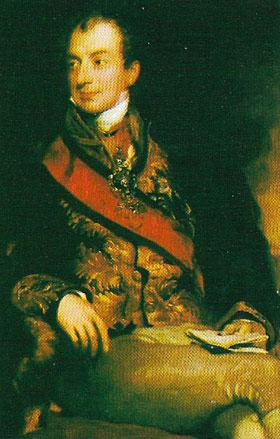 |
| Prince Clemens Von Metternich was foreign minister of the Hapsburg Empire from 1809 until the revolution of 1848. To many he seemed the champion of autocracy, reaction and the police state. |
